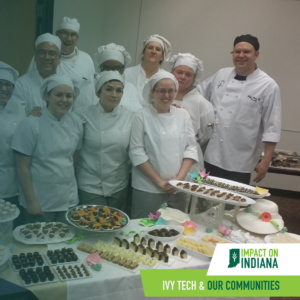
Culinary School at Ivy Tech’s South Bend/Elkhart Campus is Cooking Up Something Special
Impact on Indiana: Ivy Tech and Our Communities is a series of profiles demonstrating how Ivy Tech Community College impacts communities across the state. The following profile spotlights the impact of Chris Pitt, program chair of hospitality administration at the South Bend/Elkhart campus.
Impact on Indiana: Tune into the Food Network and you’ll see the most impeccably created foods imaginable. From cupcakes to pancakes, the food looks like it jumped right out of Bon Appetit magazine.
Chris Pitt, chair of the hospitality administration program at Ivy Tech’s South Bend/Elkhart campus, said the magic of television has driven interest for students at Ivy Tech who want to make culinary arts a career. But sometimes, they go through an awakening.
“Many students want to be what they see on TV,” Pitt said. “The reality, though, is it’s much harder than it looks.”
But that’s where Pitt steps in. While creating the best foods in the world is challenging and exhausting work, Pitt makes it fun, interesting, and a potential career for those willing to follow their passions.
Pitt – commonly referred to as “Chefy” by his students – takes on a lot of roles at Ivy Tech: he’s chef, teacher, coach, and friend – all in the spirit of pulling out the culinary instincts in his students. And it’s working: the American Culinary Federation recently awarded Ivy Tech’s South Bend/Elkhart culinary program a 7-year accreditation, which is reserved for programs with exemplary results. Only 80 schools in the U.S. have 7-year accreditations (including Ivy Tech programs in Indianapolis and Bloomington).
Impact on Communities: Being the leader of a culinary program is more than teaching students how to make a great souffle. Pitt grounds his students in the realities of life and immerses them in other cultures. They partner with local organizations that focus on food insecurity. And every two years, he takes a group of students to France so they can learn and appreciate the approaches of another culture.
Here at home, Pitt works with students from numerous walks of life. And that makes it even more special.
“Some students may have low incomes and are food insecure,” he said. “Much of what they make, they are allowed to take home with the promise of sharing it with others. Take it to work if you want … but share, talk about what you do, and grow your brand. We teach them to be a brand from the get-go – and we meet them where they are in life.”
Impact on People: Roughly 130 students are enrolled in the culinary program at the South Bend/Elkhart campus. About 95 percent of Pitt’s students take on professional culinary roles, mostly in the hospitality industry: some are hired by local partners, such as the University of Notre Dame or Four Winds Casino, while others work at Disney or other resorts. A few have gone international.
At the end of the day, Pitt wants his students to love their craft – whether it’s being a pastry chef or something else. The college experience is typically transformational, with students finding their passions and awakening to new opportunities. Pitt, in fact, wanted to be an architect when he was in high school. When he went to college, he struggled with physics before discovering his own passion – particularly during an internship with a German chef.
“Our campus has an outstanding nursing program,” he said. “But some students may come in and decide nursing is not their ideal career choice. They may look at culinary arts as another option. That’s the beauty of Ivy Tech: we are here to help students figure it out.”
Pitt also wants culinary arts embraced by more Americans. In France, he said, students who unveiled plans to become pastry chefs are treated as if they are becoming a doctor. In the U.S., industries with less risk and more potential rewards are embraced.
But Pitt is focused on making progress – even one parent at a time.
“Sometimes we invite families in so they can see what we are doing,” Pitt said. “One time after a class, a mother of one of our students called me. She told me she had no idea what we had been training her daughter. She thought she was learning to be a glorified cake decorator.”
For many culinary students, their craft is more than a hobby. It’s a calling.
